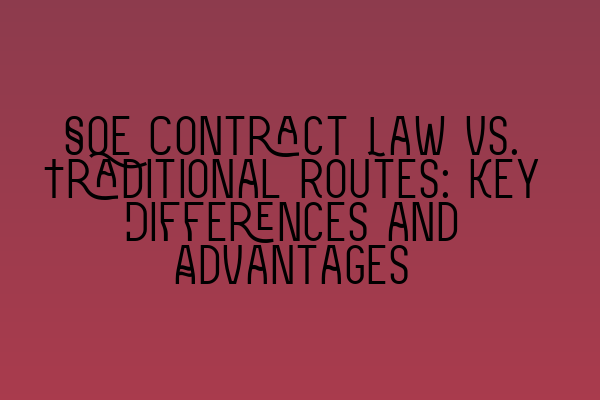SQE Contract Law vs. Traditional Routes: Key Differences and Advantages
In the legal profession, there are various routes to becoming a qualified solicitor. Traditionally, aspiring solicitors would go through the LPC (Legal Practice Course) followed by a training contract. However, the recent introduction of the Solicitors Qualifying Exam (SQE) has brought about a new path for individuals who wish to pursue a career in contract law. In this blog post, we will explore the key differences and advantages of the SQE Contract Law route compared to the traditional routes.
Firstly, let’s delve into the SQE Contract Law route. The SQE is a two-part examination that assesses candidates on their legal knowledge and practical skills. The first part, SQE1, focuses on assessing candidates’ functioning legal knowledge through multiple-choice questions and practical legal skills questions. The second part, SQE2, evaluates candidates’ practical legal skills through written and oral tasks. This new assessment method aims to ensure that candidates are equipped with the necessary skills and knowledge to practice as solicitors.
One of the key advantages of the SQE Contract Law route is its flexibility. Unlike the traditional LPC route, which requires a significant investment of time and money, the SQE allows candidates to study at their own pace and take the exams when they feel ready. This flexibility is particularly beneficial for individuals who may have other commitments such as work or family responsibilities. Additionally, the SQE allows candidates to focus on the specific areas of law that are relevant to contract law, ensuring that their knowledge and skills are directly applicable to their desired career path.
Furthermore, the SQE Contract Law route offers cost-saving benefits. The traditional LPC route can be financially burdensome, with tuition fees and living expenses adding up over the course of the two-year program. In contrast, the SQE allows candidates to choose from a range of training providers, offering more flexibility in terms of cost and study options. This makes the SQE an attractive choice for individuals who are mindful of their financial resources.
Another advantage of the SQE Contract Law route is the practical nature of the assessment. Unlike the LPC route, where theoretical knowledge is primarily tested through written exams, the SQE assesses candidates’ practical legal skills through a combination of written and oral tasks. This ensures that candidates are equipped with the necessary skills to handle real-life legal scenarios, enhancing their employability in a competitive job market.
It is worth noting that the SQE Contract Law route is a relatively new development, and there may be some uncertainties surrounding its implementation. However, with the support of reputable training providers and the recognition of the Solicitors Regulation Authority (SRA), the SQE is gaining credibility and acceptance within the legal profession.
To conclude, the SQE Contract Law route offers several key differences and advantages compared to the traditional routes. Its flexibility, cost-saving benefits, and practical assessment methods make it an appealing option for individuals interested in pursuing a career in contract law. However, it is crucial for aspiring solicitors to research and carefully consider their options before making a decision. If you’re interested in further resources and preparation for the SQE exams, check out our related articles:
– SQE 1 Practice Exam Questions
– SQE 1 Practice Mocks FLK1 FLK2
– SQE 2 Preparation Courses
– SQE 1 Preparation Courses
– SRA SQE Exam Dates
By staying informed and prepared, you can make an informed decision that aligns with your career goals in the field of contract law. Good luck!
